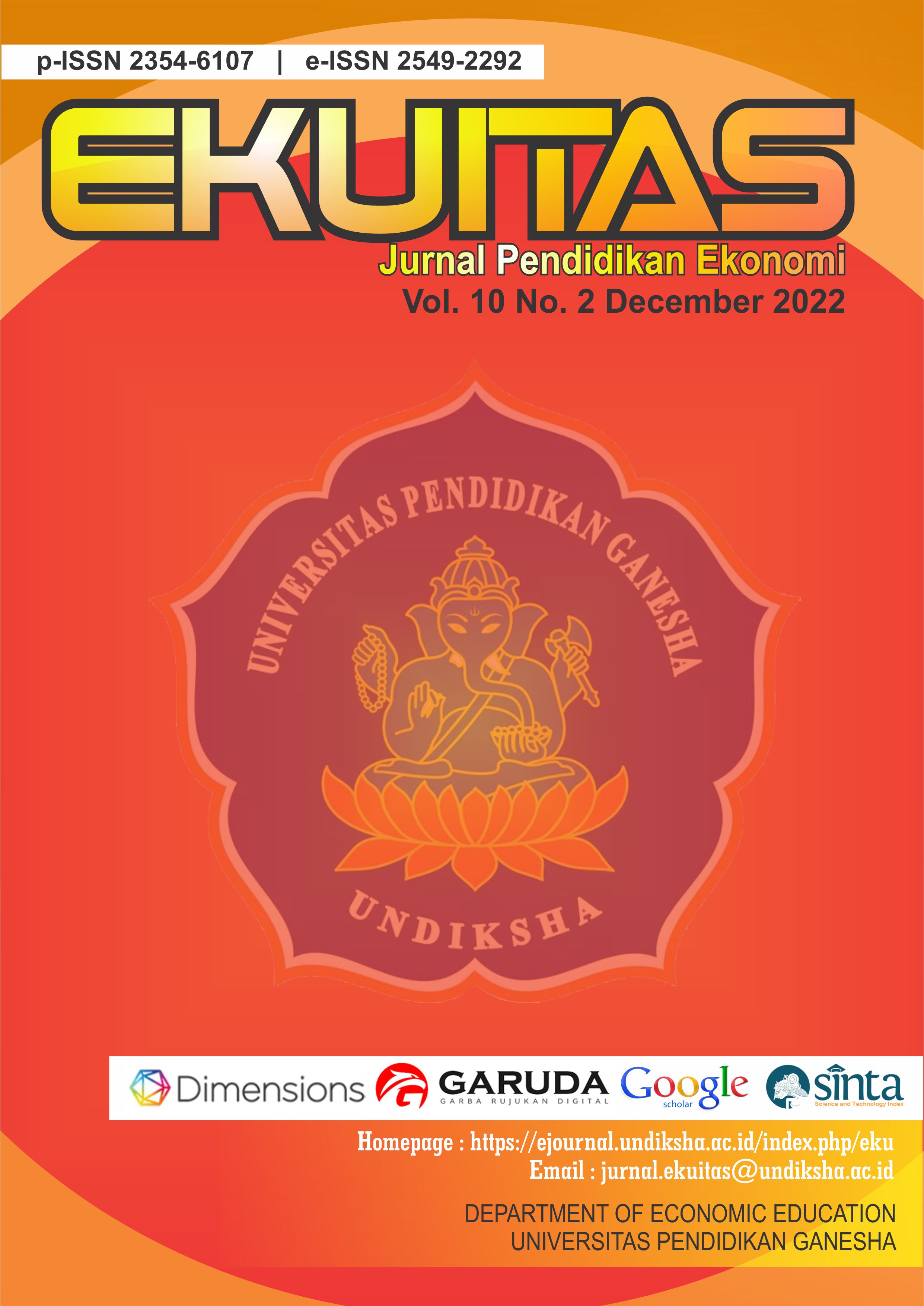Pengembangan Model Pembelajaran Ekonomi Koperasi untuk Meningkatkan Kemampuan Berpikir Kristis Mahasiswa
DOI:
https://doi.org/10.23887/ekuitas.v10i2.51159Keywords:
Cooperative economy, cooperative economic learning model, critical thinking skillsAbstract
Cooperative Economics is one of the courses within the scope of Economic Education as a basis for understanding cooperatives and the people's economy. In presenting the Cooperative Economics course, critical thinking skills are needed to understand current issues regarding people's economic problems. The purpose of this research is to develop a cooperative economic learning model to improve students' critical thinking skills through recent case studies. The development method in this study adopted the R&D model from Brog and Gall with stages; (1) Preliminary research, (2) research planning, (3) model development, (4) expert testing and implementation of field trials, (5) revision of field test results, (6) implementation of main field tests, (7) revision of results main field test, (8) due diligence, (9) final revision of due diligence results, and (10) dissemination and implementation of the final product. Furthermore, the cooperative economic learning model is applied with quite effective results with an average of 58.7376 based on the core gain analysis. These results also provide the conclusion that the development of learning models is quite effective in improving students' critical thinking skills.
References
Aditiya, N., Bachri, S., & Yuniyanto, T. (2016). Pemikiran Ekonomi Kerakyatan Mohammad Hatta 1953-1972 Dan Implementasinya Terhadap Pembelajaran Kelas XII SMA. Jurnal CANDI, 13(1), 53–71.
Hartono, Y. (2017). Model Pembelajaran Nilai-Nilai Karakter Bangsa Di Indonesia Dari Masa Ke Masa. Agastya: Jurnal Sejarah Dan Pembelajarannya, 7(01), 34–48. https://doi.org/10.25273/ajsp.v7i01.1059
Hasan, M. (2017). Pendidikan Ekonomi Informal dan Literasi Keuangan. Membangun Indonesia Melalui Riset, 677–680. http://eprints.unm.ac.id/5419/
Kunantiyorini, A. (2018). Pancasila sebagai Sumber Hukum dalam Sistem Hukum Nasional Pancasila as the Source of Law in the National Legal System. Jurnal Konstitusi, 15(1), 27–49.
Lestari, Sri and , Drs. Budi Sutrisno, M. P. (2016). Peningkatan Prestasi Mata Pelajaran Ekonomi Melalui Penerapan Model Pembelajaran Problem Based Learning (Pbl) Siswa Kelas X SMA Negeri 2 Sukoharjo Tahun Ajaran 2015/2016. August.
http://eprints.ums.ac.id/id/eprint/46643
Luis, F., & Moncayo, G. (n.d.). EVALUASI KINERJA DINAS KOPERASI PERINDUSTRIAN DAN PERDAGANGAN KABUPATEN MUARO JAMBI DALAM PEMBINAAN KOPERASI DI KECAMATAN SEKERNAN KABUPATEN MUARO JAMBI. http://repository.uinjambi.ac.id/id/eprint/3466
Mufallihah, M. (2021). Pengawasan Otoritas Jasa Keuangan Terhadap Layanan Pinjaman Online Berbadan Koperasi yang Belum Berizin di Otoritas Jasa Keuangan. 5(3), 89–100.
Pamungkas, H. P., Witjaksono, M., & Mintarti, S. U. (2017). Pengembangan Pembelajaran Ekonomi Yang Konstruktivistik Dengan Perspektif Self Regulated Learning. National Conference on …. https://core.ac.uk/download/pdf/267024156.pdf
Rachmaditya, D. (2020). Peran Koperasi Sebagai Soko Guru Perekonomian Ditinjau Dari Hukum Ekonomi Syariah (Studi Kasus di KUD Lampisi Kecamatan Renah Mendaluh Kabupaten Tanjung Jabung Barat).
Rinawati, A. (2020). Pancasila Dan Eksistensi Ekonomi Kerakyatan Dalam Menghadapi Kapitalisme Global. Jurnal Terapung : Ilmu - Ilmu Sosial, 2(2), 1–12. https://doi.org/10.31602/jt.v2i2.3972
Susilowati, R. (2018). Penerapan Model Problem Based Learning Berbantu Media Audio Visual Untuk Meningkatkan Berpikir Kritis Kelas 4 Sd. Jurnal Imiah Pendidikan Dan Pembelajaran, 2(1), 57–69. https://doi.org/10.23887/jipp.v2i1.13870
Yeni Handayani, K. T. A. (2021). Pemikiran Moh. Hatta Terhadap Pembentukan Ekonomi Koperasi Di Indonesia (1945-1947). 9(1), 10–16. http://jurnal.stkipsetiabudhi.ac.id/index.php/kalamanca/article/download/77/44/62
Downloads
Published
How to Cite
Issue
Section
License

This work is licensed under a Creative Commons Attribution-ShareAlike 4.0 International License.








